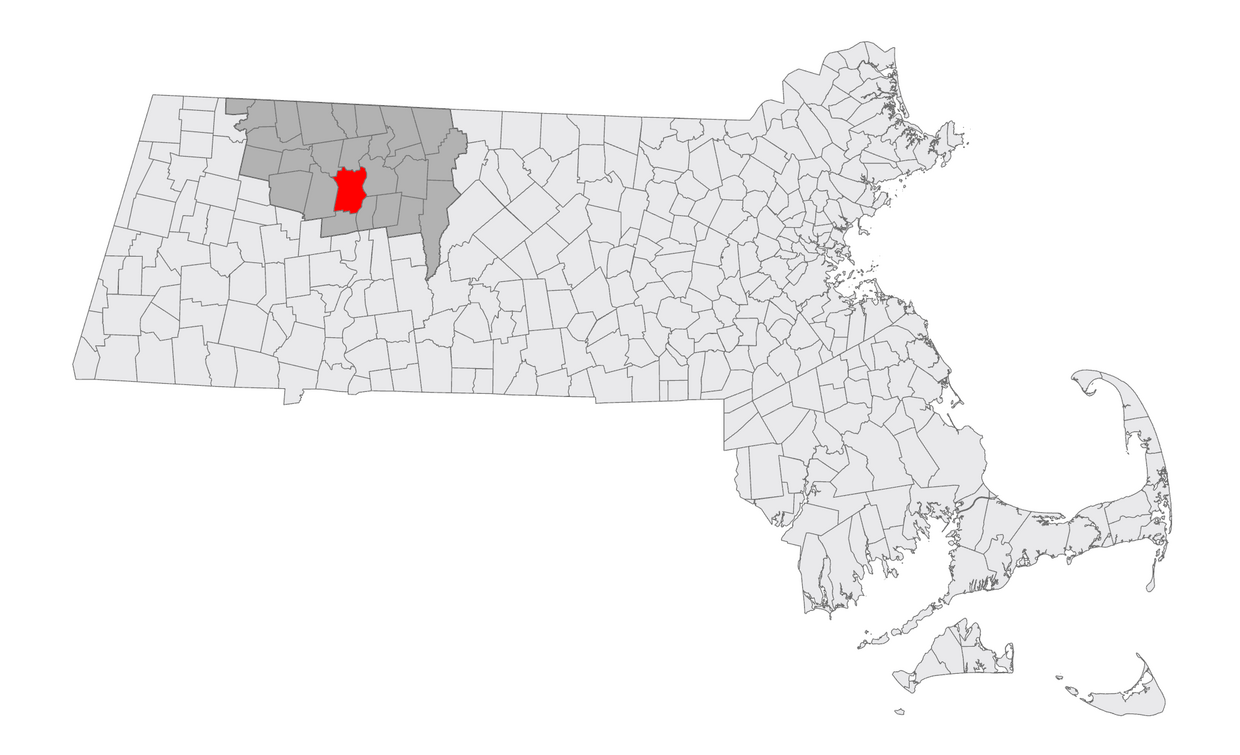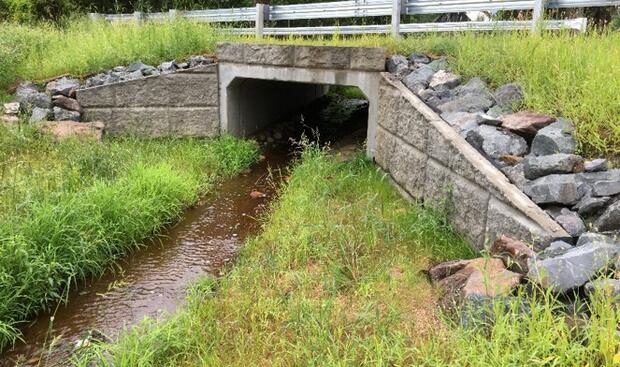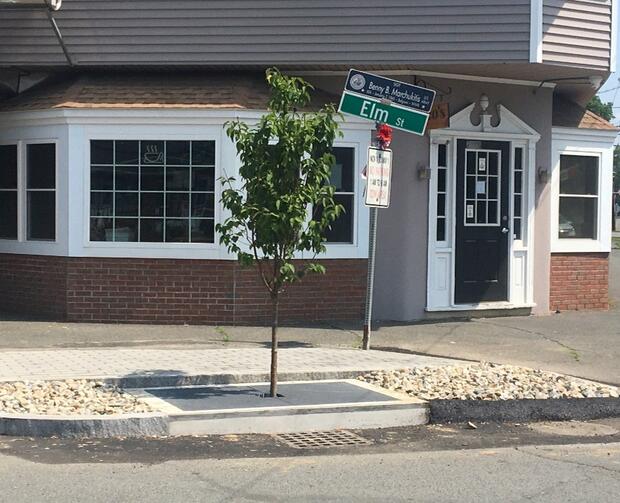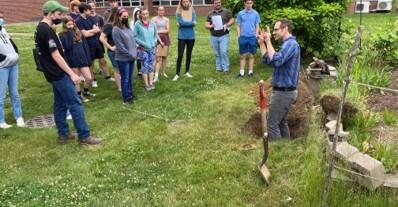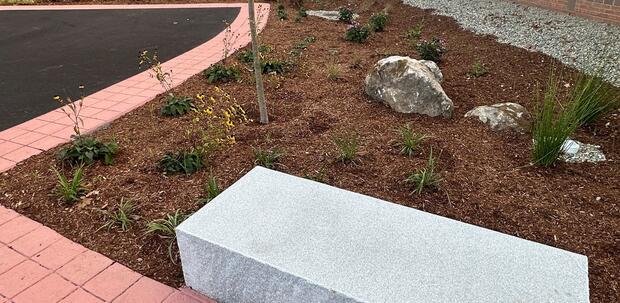Overview
Deerfield is a town in Franklin County, Massachusetts, in the north eastern part of the state. They have a population of 5,176 people and an area of 32.4 square miles. Climate hazards present in Deerfield include severe weather, tornadoes, hurricanes/tropical storms, inland flooding, and severe winter storms.
Core Team
The MVP 2.0 Core team is a group of municipal staff and Community Liaisons who work together to identify local climate resilience priorities and implement a project that supports those priorities.
Deerfield's Community Liaisons includes representation from:
- Conservation Commission Member
- School Community Liaison
- Student Liaison
- Planning Board Member
- Senior Liaison
- Former Selectboard Member
Deerfield's Core Team includes municipal representation from:
- Assistant Town Admin
- Select Board Member
- Farm Liaison
- Planning Board Member
Community Resilience Priorities
Community resilience priorities are practical actions created during the MVP 2.0 Planning Grant process. They were shaped through community input, thoughtful discussion about changing local needs, and feedback from Environmental Justice groups and other community members.
Deerfield, in partnership with their Core Team, identified the following priorities through the MVP 2.0 process.
| Priorities | Potential Actions | ||
|---|---|---|---|
| Priority 1: Reduce flooding which unequally impacts residents with the least resources to respond to flooding the areas with the communities that have the least resources. Address housing that is vulnerable to flooding, both within and beyond the FEMA mapped floodplain. Address flooding at Deerfield Inn area in historic Deerfield. Protect flood storage areas, especially natural valley storage. | Potential Actions: To be determined. | ||
| Priority 2: Keep Emergency Action and Hazard Mitigation Plans current and up-to-date. | Potential Actions: To be determined. | ||
| Priority 3: Support climate-friendly lawns and pollinator meadows on private and public lands. | Potential Actions: To be determined. | ||
| Priority 4: Food and resources for the most sensitive populations, especially low income and seniors. | Potential Actions: To be determined. | ||
| Priority 5: Address the health challenges of “hidden” poverty in Deerfield, the populations that fall through the cracks because poverty is hidden within the community. | Potential Actions: To be determined. | ||
| Priority 6: Green streets and complete streets for town center to resilient economy. | Potential Actions: To be determined. | ||
| Priority 7: Preserve land to protect critical natural systems and nature based ecological services. | Potential Actions: To be determined. | ||
| Priority 8: Healthy soils implementation of Deerfield Healthy Soils report. | Potential Actions: To be determined. | ||
| Priority 9: Replace road culverts as necessary to ensure transportation infrastructure can standup to the future storms. | Potential Actions: To be determined. | ||
| Priority 10: Use nature based solutions with green parking lot amenities for library and campus. | Potential Actions: To be determined. | ||
| Priority 11: Feasibility study and design for microgrid electric network with geothermal and solar energy for town center. | Potential Actions: To be determined. | ||
| Priority 12: Municipal tree nursery and planting program. | Potential Actions: To be determined. | ||
Deerfield's MVP 2.0 Seed Project: Blacksmith/Sugarloaf Watershed Analysis and Land Protection for Climate Resiliency
Deerfield received funding to implement a Seed Project that addresses one or more of their climate resilience priorities. They plan to conduct a hydrological watershed analysis of the Blacksmith/ Sugarloaf Brook watershed, including evaluating stormwater/ stream flows and projected flows, as well as assessing culverts needing replacement. The goals of this project are to better understand and address problems with chronic flooding in South Deerfield’s town center.
The activities of this project include:
- Conduct a stream reconnaissance and hydrological watershed analysis of the Blacksmith/ Sugarloaf Brook watershed.
- Perform a culvert assessment to identify which culverts create the greatest risk of causing flooding and/or road damage.
- Prepare recommendations for future MVP Action Grant priorities, identifying the culverts in the greatest need, those on public property, and those which will create the greatest social benefits for Deerfield and the town’s most vulnerable populations.
- Explore nature-based solutions to complement built infrastructure, including protection or restoration of flood storage areas.
- Create concept or preliminary designs for the top priority actions.
- Cooperate with Deerfield and Deerfield’s MVP program manager consultants in community engagement.
Deerfield's Action Grant Projects
The MVP Action Grant provides funding to communities that want to take important steps to prepare for climate change, such as dealing with extreme weather, flooding, rising sea levels, and extreme heat.
Municipal Vulnerability Preparedness Plan Implementation (FY18)
The Town of Deerfield will design and permit for the replacement of a vulnerable culvert on Mill Village Road to accommodate the larger flows anticipated with climate change and accommodate fish and wildlife passage. The Town will update Floodplain zoning regulations to protect natural flood storage areas and incorporate new flood maps reflecting climate change.
Reducing Flooding Vulnerability in Deerfield (FY19)
The Town proposes installation of green infrastructure, development of a green infrastructure policy, replacement of two culverts to improve resiliency and wildlife passage, coordination of a community climate awareness event, public education on the town’s emergency alert systems, creation of an evacuation plan for potential dam failures and floods on the Deerfield River, and a land conservation priority plan for protecting the Deerfield River floodplain. Read this projects MVP Case Study.
Flood Resiliency Through Green Infrastructure in Deerfield (FY20)
Using design plans funded by a 2019 MVP Action Grant, the Town will replace the failing Kelleher Drive culvert, and will install green infrastructure in both the town center and at the Deerfield Elementary School. The project will also revise current Deerfield zoning and other bylaws to promote climate resiliency as well as low impact development. The Town will actively engage youth from Deerfield and surrounding communities by involving students at Frontier Regional High School in designing water conservation measures or the Frontier Regional High School campus. Read this projects MVP Case Study.
Healthy Soils, Green Infrastructure Policy and Climate Resiliency Public Engagement in Deerfield (FY22)
The goal of this project is to actively engage the general public, businesses, students, and town boards in the town’s climate resiliency initiatives. Grant funds will be used to implement Deerfield’s innovative new town policy on green infrastructure and climate resiliency, protect and manage soils for carbon sequestration, and increase public engagement through a town-wide climate resiliency forum and science class programming in local schools. Read this projects MVP Case Study.
Deerfield Green Infrastructure (FY24)
This project will implement green infrastructure projects in three key Deerfield locations, which were previously designed under MVP grants. These three key locations include the construction of rain gardens, tree box filters, and a bio-swale to reduce flooding and stormwater impacts in South Deerfield Center; the construction of rain gardens, landscape improvements, and fencing to reduce flooding and icing hazards at Deerfield Elementary School; and the construction of a tree box filter to reduce flooding impacts to valuable historic properties in Historic Deerfield. These projects will include elements of community engagement such as curriculum development for Deerfield Elementary School and will address Deerfield’s key climate impacts and vulnerabilities to improve community resilience. Read this projects MVP Case Study.
Bloody Brook Resilience Hydrologic/Hydraulic Modeling (FY25)
A central component of this effort will be the creation of a hydraulic model of the Bloody Brook in the heart of South Deerfield. This work will help generate an improved understanding of the brook's history and behavior and pinpoint bottlenecks. Building off of the City of Easthampton's Homeowner's Guide to Do-It-Yourself Stormwater Management Solutions ("Sinking the Storm"), the project team will develop a list of possible interventions that the Town and individual property owners can use to address impacts from excess stormwater and stream flooding that acknowledges the high water table in this part of the Connecticut River Valley. This work will also result in prioritization of culverts for upsizing and areas for improved stormwater management.
